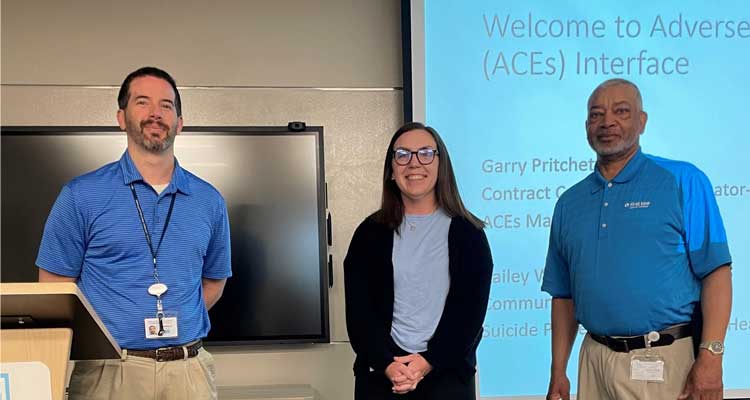Can you tell us a little about yourself and your position with DPCS?
I am a Prevention Program Manager at Danville-Pittsylvania Community Services. I have the pleasure and honor of overseeing all our community-based prevention work, which includes mental health wellness, suicide prevention, trauma and resiliency, substance misuse prevention, and problem gambling prevention. This work includes acting as the lead agency for several collaborative groups: West Piedmont Trauma and Resiliency Community Network (WPTRCN), Regional Alliance for Substance Abuse Prevention (RASAP), and the Southern Virginia Problem Gambling Collaborative. We also work with the Danville Area Veteran Suicide Prevention Coalition and American Foundation for Suicide Prevention on our suicide prevention efforts. We also offer a number of trainings free to the community on a regular basis. I have worked for Danville-Pittsylvania Community Services for over 12 years, and have been serving in my current role for the last 6years. It is a delight working alongside an incredible group of team members and community members who strive towards making a difference daily in the lives of residents in the City of Danville and Pittsylvania County to prevent a litany of future mental, physical health, and social issues.
Can you tell us a little about Adverse Childhood Experiences?
Adverse Childhood Experiences or ACEs are stressful events that occur in childhood birth until turning 18 that are potentially traumatic. Examples include violence, abuse, neglect, loss of a loved one, housing instability, having mental health or justice related problems in the household, substance use in the household, experiencing a natural disaster, etc. ACEs have a profound effect on people’s mental health, physical health, and social health.
What makes ACES awareness so important to you?
ACEs awareness is mental health awareness. ACEs awareness is physical health awareness. ACEs is social health awareness. ACEs awareness helps us understand human behavior as well as relationships. ACEs awareness helps us understand ourselves, our children, our significant others, our neighbors, our family, our church members, everyone we pass in Walmart, Food Lion, or Dollar General, or on the street walking so much better. In my opinion, learning about ACEs is the most important information anyone will ever learn. It is the key to reducing a host of issues, challenges, and even early death! It can help us prevent our loved ones from developing horrendous physical health issues like heart disease, diabetes, and cancer; it can help prevent our loved ones from developing anxiety, depression, and more serious mental health problems; it can help us help others have more positive relationships. It helps us be more compassionate people and increase resiliency for the entire community. This knowledge has incredible potential to change the way you look at behaviors, interact with people, and live your life.
What type of training is offered? And is it available for everyone?
Adverse Childhood Experiences (ACEs) Interface training is a 3 hour training that discusses how the brain is altered due to experiencing adversity, how the immune system is compromised, and how our DNA is altered. The class covers how these changes lead to drastically higher risk for mental health, physical health, and social health problems. After learning how these changes affect us, the class covers what we can do to mitigate the harm by discussing protective factors to build resilience.
Is training available locally? And when?
We offer training approximately every month to month and half at DPCS. Always check out DPCS’ Facebook page for the latest dates, times, and registration information. There is no cost for the training. For groups of 15 or more the training can be brought to your organization. We schedule training for half of the year at a time, so the schedule for July through December will be finalized in early May, then January through June will be finalized in early November. Most training courses take place in the training room at our office at 245 Hairston Street.
What are the steps if someone wants to get trained?
Once you have identified a date/time that works with your schedule, you can email Bonnie at btrammell@dpcs.org (or call 434-799-0456×3810) to register for a session. If you have a group you would like to coordinate at training for (15 or more) you can reach out to Bonnie (btrammell@dpcs.org) to coordinate for a training for your church, employer, civic organization or any other group.
Why is it important to take ACEs Interface?
ACEs Interface helps us understand the increased risk of almost every type of physical health issue, mental health issue, and social issues and behavioral issues that people experience. It gives us insight into human behavior and once you learn why someone may be acting irrationally, aggressively, is emotionally distant, forgetful, or has difficulty paying attention to you, you can respond compassionately much more easily. By understanding this information, you will better learn how to help someone calm down when escalated, and how to help them decrease the risk of all the poor life outcomes by helping them build more resilience. This training helps us prevent poor health outcomes and could increase life expectancy by 20 years, as well as save someone’s life (death by suicide is 5000% more likely for individuals with high levels of adversity)
Where can someone find out more information about Adverse Childhood Experiences?
